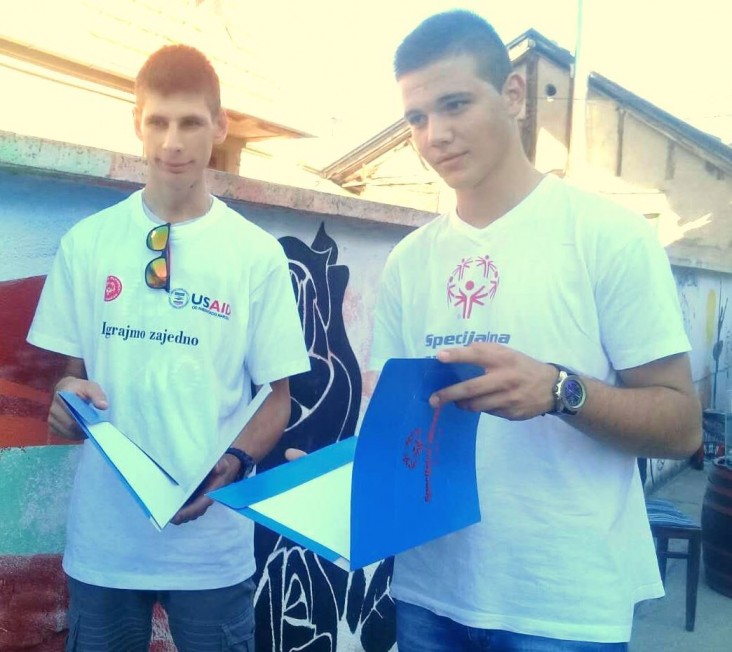Speeches Shim

June 2018 — Most children with disabilities in Serbia attend special schools even though their inclusion in regular schools is encouraged by law. Their limited interaction with peers from regular schools fuels prejudices and stereotypes that are often carried into adulthood.
Goran Marić, 19, is from a special school and Luka Međugorac, 17, is from a mainstream school in Kruševac, a small city in central Serbia. They met when they became members of an inclusive youth activation committee in October 2015 as part of the USAID-funded Play Unified project implemented by Special Olympics Serbia.
As team leaders, their task was to organize inclusive sports events and recruit peers with and without intellectual disabilities from their schools as participants.
“I enjoy when Luka and I organize events together. It’s an amazing feeling being able to invite my friends and make new friends when we organize a new event,” said Marić. “I always wanted to try badminton, and now I was able to invite everyone to participate and play.”
As the committee worked together, the two students fell into an easy comradery. Međugorac appreciated Marić’s open personality and infectious humor. Marić liked Međugorac’s thoughtfulness and sincerity. Both approached tasks seriously, with purpose, yet worked in an easy and fun way.
“We enjoy our roles very much and take them with great responsibility. I never considered myself or any of my classmates as a leader,” said Međugorac. “Once we started to discuss what we wanted to do, I began to see that we were showing initiative. For me, that’s leadership.”
The teens and the two other committee members, Ivana Vučić and Anđela Milošević, recruited almost 100 peers, introducing them to inclusive basketball, volleyball and badminton.
“Giving youth hands-on experience in leadership and inclusion will ensure that these concepts stay with them when they become adults,” said Mirela Milojević, their teacher facilitator.
In total, the 10 inclusive youth committees, each from a different municipality, developed 40 youth initiatives, resulting in over 1,500 peers participating in inclusive sports and other socially inclusive activities for the first time.
Planning events together, exchanging ideas and traveling with the Unified sports team helped foster understanding, led to friendships, and taught young people the value of working together and helping each other.
“We don’t see differences. We see friends,” said Nikola Jovčić, 18, from a mainstream school in Čačak.
“We all realized that friendship is something beautiful,” said Marko Prolić, 23, from a special school in Čačak.
“Longer term, when youth who participated in the program become adults, they are the ones who will advocate for creating tolerant and accepting communities,” said Aleksandar Stanojević, national director of Special Olymipcs Serbia.
The experience also changes participants’ self-confidence and sense of initiative. Take Miroslav Đorđević, 19, member of a youth activation committee from Vranje. Đorđević graduated from a special school in June 2017. Everyone who knows him said he was shy and unsure, but he started to blossom as he joined the committee and played sports on a Unified team. By the time he graduated, he was a confident young man who respected himself as well as others.
With purpose and determination, he took it upon himself to find a job when he finished school. Today he travels 25 kilometers one way to work as a mechanic in the city. Đorđević likes his job but said he, like several other students who graduated in 2017, will always find time to participate in Unified sports and will remain in touch with his school and the friends he made over the last two years.
“Seeing Miroslav develop from a boy to a man in such a positive way shows that inclusion leads to increased participation in all of life’s roles and activities,” said his teacher, Goran Jakovčevski.
The two-year Play Unified project ended in October 2017. By providing inclusive sports and educational opportunities, the USAID-supported activity equipped young people with the skills and knowledge necessary to foster positive, inclusive environments that promote acceptance, respect and dignity for all youth.
LINKS
Follow @USAIDSerbia, on Facebook, on YouTube, on Flickr

Comment
Make a general inquiry or suggest an improvement.